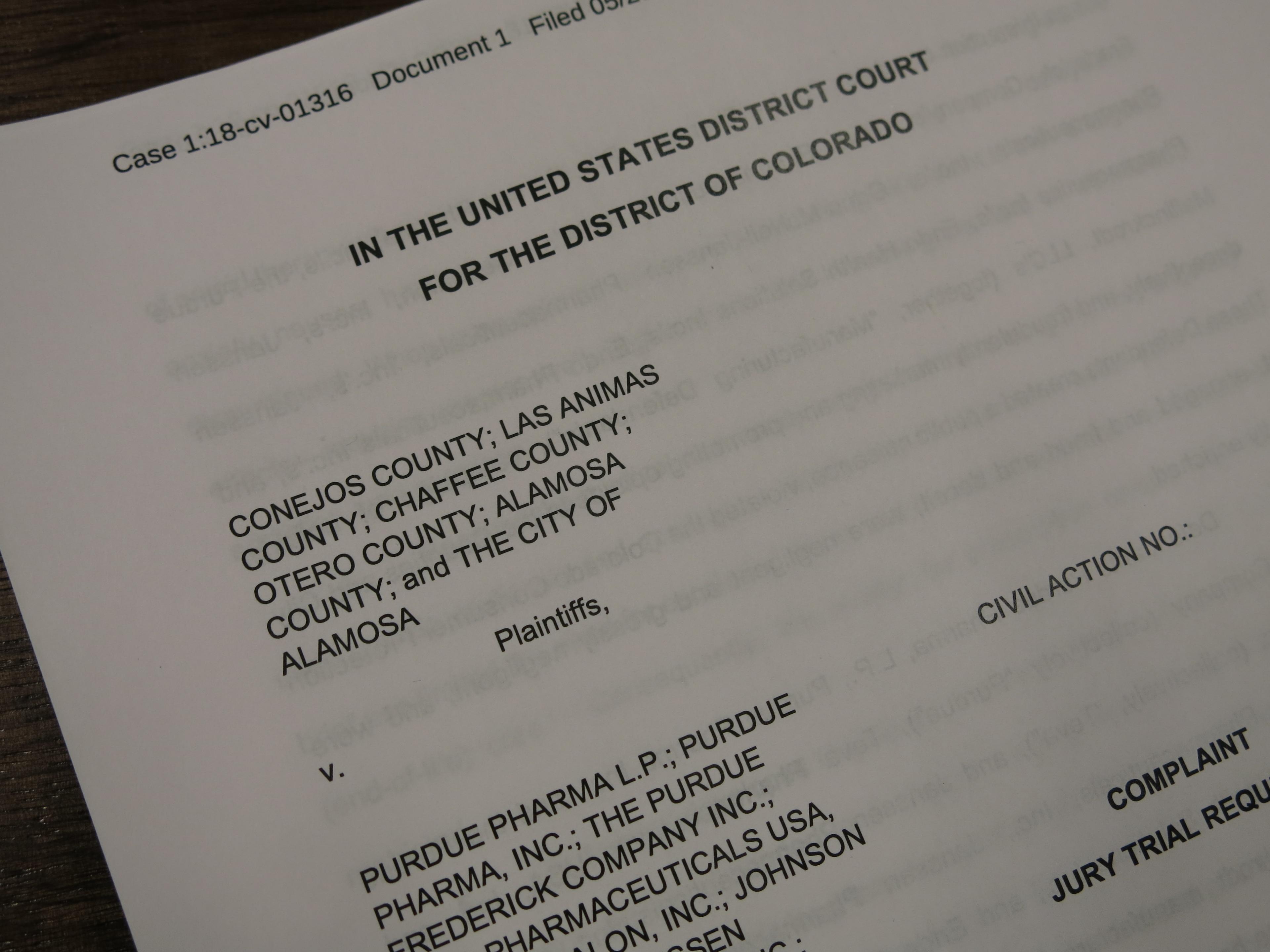

Five more Colorado counties are now suing some of the biggest opioid manufacturers in the U.S.
Conejos, Las Animas, Chaffee, Otero and Alamosa counties and the city of Alamosa have filed suit in U.S. District Court in Denver against companies including Purdue Pharma, Johnson & Johnson, Cephalon Inc., Teva Pharmaceuticals, Janssen Pharmaceuticals, Endo Pharmaceuticals and Mallinckrodt LLC.
- Legislation That Would Limit Opioid Prescriptions Divides Some Doctors
- In The Heart Of Colorado’s Opioid Crisis, This Rural Doctor Is An Army Of One
- Opioids Make Headlines In Colorado, But Meth Ruins More And More Lives
They allege the number of opioid prescriptions in their jurisdictions topped the number of residents and led to deaths, overdoses, and problems like domestic violence and child abuse.
According to the suit, nearly 21,000 opioid prescriptions were dispensed in 2015 in Alamosa County, which has a population of more than 16,600. In Otero County, which has around 18,000 residents, more than 30,000 opioid prescriptions were filled for that same year. Chaffee County saw more than 26,000 opioid prescriptions dispensed that year for a population of about 19,000.
"We issue more prescriptions per capita than anywhere else in the state as an example, or most other places in the state. And we're one of the small counties," said Keith Goodwin is an Otero County Commissioner. "Are we sicker than everybody else? I don't think so."
The suit states “scientific evidence demonstrates a close link between opioid prescriptions and opioid abuse.” It cites a 2007 study, which found a “very strong correlation” between exposure to opioids “measured by prescriptions filled” and their abuse, with “particularly compelling data” for extended release oxycodone, also called Oxycontin.
The suit alleges the companies engaged in a “campaign of unfairly, deceptively and fraudulently marketing and promoting opioids” in the counties and the city of Alamosa. It accuses the firms of creating a public nuisance and engaging in “fraud and deceit, and negligence” and says they were “unjustly enriched.”
"What I hope the drug companies do in response to this is acknowledge the role that their actions have had in fostering the epidemic and work to address it," said Alamosa City Attorney Erich Schwiesow.
He hoped that through winning the lawsuit or a settlement, the counties could receive funds to help deal with the opioid epidemic, which has taxed city services including police, jails, medical facilities, treatment and social services.
Sam Mitchell, an attorney for the counties and the city of Alamosa, said the companies deliberately targeted smaller counties to sell opioids. They knew that the drugs would be over-prescribed there based on how much they shipped to those locations, Mitchell added.
"These communities have been thrown by the wayside," he said. "They (the drug companies) knew that's where they could make money."
Mitchell says some counties, such as Conejos, saw their death rates from opioid overdoses double from 2002 to 2014.
The counties join Huerfano County, which filed a similar suit earlier this year, and other jurisdictions around the country. Mitchell indicated that the cities of Arvada and Wheat Ridge were also considering joining the suit.
The drug companies have vigorously denied wrongdoing, arguing the drugs were federally approved.
One of the pharmaceuticals companies named in the suit, Endo, denies the allegations, said Endo representative Heather Zoumas Lubeski.
"...The legitimate access needs of the millions of patients suffering from acute or chronic pain who rely on opioid medications must be considered," said Endo in a statement. "We remain committed to working collaboratively and proactively on a comprehensive solution to the opioid abuse crisis and to continuing Endo's longstanding mission of improving patients' lives."
Pharmaceutical company Teva also denied wrongdoing, and cited actions taken in the wake of the opioid crisis.
"...We take a multi-faceted approach to this complex issue; we work to educate communities and healthcare providers on appropriate medicine use and prescribing, we comply closely with all relevant federal and state regulations regarding these medicines, and, through our R&D pipeline, we are developing non-opioid treatments that have the potential to bring relief to patients in chronic pain," said a statement from Doris Saltkill, a Teva representative.
Johnson & Johnson echoed the sentiments of the other defendants in the suit.
"Our actions in the marketing and promotion of these medicines were appropriate and responsible," said a statement from Johnson & Johnson. "The labels for our prescription opioid pain medicines provide information about their risks and benefits, and the allegations made against our company are baseless and unsubstantiated. In fact, our medications have some of the lowest rates of abuse among this class of medications."
For some users, a dependence on opioids can lead to more dangerous drug use. One Alamosa resident, Roslyn Garcia, told CPR News in 2017 that she became addicted to opioids after her jaw was broken in a domestic violence incident. Eventually, she shifted to heroin because it was cheaper.
“It's not cheap after you get addicted to it,” Roslyn said. “Your body needs it in order to function.”









